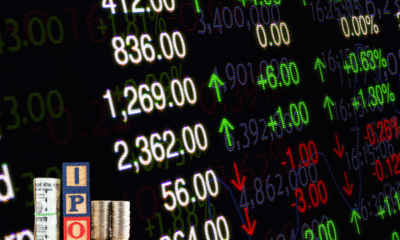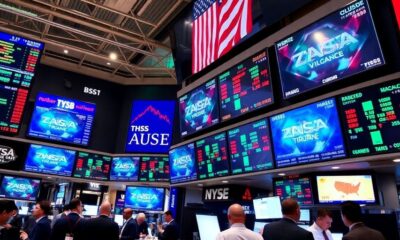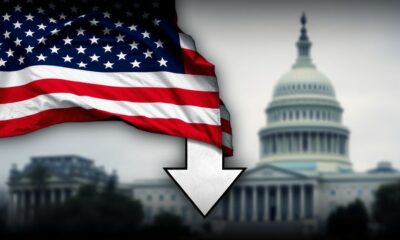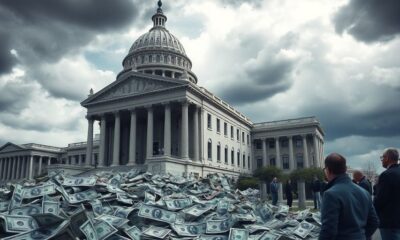Business
Market Mayhem: Trump’s Tariff Threats Ignite Trade Tensions

U.S. stock markets experienced significant turmoil on May 23, 2025, as President Donald Trump announced potential tariffs of up to 50% on European goods and a 25% tariff on Apple iPhones not manufactured in the U.S. This unexpected escalation in trade tensions sent shockwaves through Wall Street, leading to widespread declines across major indexes.
Key Takeaways
- President Trump proposed a 50% tariff on imports from the European Union, effective June 1.
- Apple shares fell sharply after Trump threatened a 25% tariff on iPhones not made in the U.S.
- The Dow Jones Industrial Average dropped 256 points, while the S&P 500 and Nasdaq also posted significant losses.
- The market’s volatility reflects ongoing concerns about trade policies and their impact on economic growth.
Market Reaction
The announcement from Trump reignited fears of a trade war, causing all three major U.S. stock indexes to close lower. The Dow Jones Industrial Average fell by 0.61%, the S&P 500 by 0.67%, and the Nasdaq Composite by 1%. This marked a notable weekly loss for the markets, with each index shedding more than 2% over the week.
- Dow Jones: -256.02 points (0.61%)
- S&P 500: -39.19 points (0.67%)
- Nasdaq: -188.53 points (1.00%)
Sector Performance
The market’s decline was broad-based, with technology, communication services, and consumer discretionary sectors being the hardest hit. Notably, Apple, a key player in the tech sector, saw its stock drop by 3% after Trump’s comments, marking its eighth consecutive day of losses.
- Technology Sector: Major companies like Microsoft, Nvidia, and Amazon all fell by over 1%.
- Consumer Discretionary: Deckers Outdoor, the parent company of UGG, plummeted nearly 20% after it refrained from providing a full-year outlook due to tariff uncertainties.
Economic Implications
Analysts warn that Trump’s renewed tariff threats could lead to increased volatility in the markets and potentially slow economic growth. The uncertainty surrounding trade policies has already begun to affect corporate earnings forecasts, with several companies citing tariff-related concerns.
- Deckers Outdoor: -19.6% after missing revenue expectations.
- Ross Stores: -11.1% after pulling its financial forecasts due to tariff impacts.
Investor Sentiment
The volatility in the markets has led to a spike in the CBOE Volatility Index, often referred to as Wall Street’s "fear gauge," which hit a two-week high. Investors are advised to remain cautious as the situation develops, with many expressing concerns about the unpredictability of Trump’s trade policies.
Conclusion
As the markets react to Trump’s tariff threats, investors are left grappling with the implications for both corporate profits and broader economic stability. The upcoming weeks will be critical in determining how these trade tensions will unfold and their potential impact on the U.S. economy.
Sources
- Stock market news for May 23, 2025, CNBC.
- Wall St falls as Trump tariff threats spark market uncertainty, Reuters.
- Stock Market on May 23, 2025: Dow closes lower, S&P 500 and Nasdaq fall after Trump threatens tariffs on
EU and Apple; U.S. stocks book weekly losses ahead of Memorial Day weekend<!– –>, MarketWatch. - Stocks Fall as Latest Trump Tariff Threats Revive Trade Concerns; Major Indexes
Post Losses for the Week, Investopedia. - Stock markets tumble after Trump threatens tariffs against European Union and Apple, PBS.
-

 Cybersecurity5 days ago
Cybersecurity5 days agoIs Your Privacy at Risk? What You Need to Know About New Data Regulations in 2025
-

 Digital Privacy6 days ago
Digital Privacy6 days agoThe Biggest Data Breaches of 2025 – And How to Protect Yourself
-

 Technology4 days ago
Technology4 days agoApple, Google, Microsoft: How Big Tech Is Shaping the Future in 2025
-

 Cybersecurity5 days ago
Cybersecurity5 days agoTop 5 Cybersecurity Tips to Keep Your Personal and Business Data Safe in 2025
-

 Blockchain Technology5 days ago
Blockchain Technology5 days agoTech Stocks to Watch: The Biggest IPOs and Market Trends in 2025
-

 Stock Market6 days ago
Stock Market6 days agoU.S. Stock Market Soars as Tariff Cuts Bring Hope for Economic Recovery
-

 Banking6 days ago
Banking6 days agoUS Credit Rating Downgraded by Moody’s: A Wake-Up Call for Fiscal Responsibility
-

 Banking6 days ago
Banking6 days agoUS Credit Rating Downgraded by Moody’s: A Wake-Up Call for Fiscal Responsibility


















